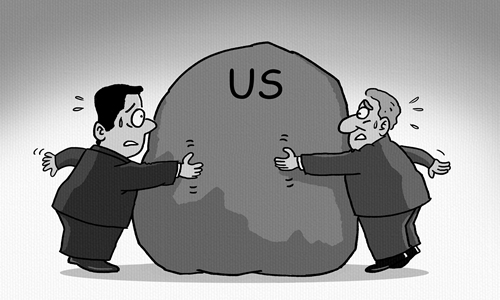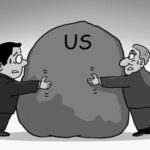Since the Australian federal election was held in May 2019, the country’s new government has not yet choreographed a clear China policy. Due to the unprecedented novel coronavirus pandemic, Canberra’s attitude toward Beijing has become even more chaotic.
Peter Dutton, Australia’s home affairs minister, said on Sunday that he stands firm on the need for an independent inquiry into the so-called origins of the coronavirus in China. Dutton’s remarks were echoing Australian Foreign Minister Marise Payne, who on April 19 called for an international inquiry into China’ handling of the coronavirus outbreak.
As these statements emerged, Chinese Ambassador to Australia Cheng Jingye suggested in an interview on Monday Australia’s words and deeds could lead the Chinese public to boycott Australian products and universities. His remarks have already been misinterpreted by Australian media as “economic coercion,” a groundless accusation that was dismissed by Chinese Foreign Ministry spokesperson Geng Shuang.
Some observers are concerned that the already strained ties between the two countries may further deteriorate. The new Australian government’s China policy has not taken shape and the process is further disturbed by the emergencies for the devastating bushfires earlier this year and the ongoing pandemic. In terms of whether to focus on grappling with China’s alleged role in the pandemic, remarks by Australian officials differ.
During his recent interview with SBS News, Prime Minister Scott Morrison condemned racist abuse leveled at Chinese Australians in the country, articulating “it was the Chinese Australian community that actually protected Australia. They led the way and the broader community is now following.” The signals that Australia is sending over its China stance are confusing.
It cannot be ignored that Canberra appears to be following Washington’s suit in pushing for a pandemic inquiry. As Western countries, they share the same ideology and position on quite a few issues. Against the backdrop of the pandemic, Western countries, led by the US, are becoming increasingly hostile toward China. If Washington intends to have an all-out confrontation with Beijing in an attempt to divert American public attention from surging US virus infections, it will surely impact the international community in general and its allies in particular. Australia is likely to act in coordination with the US, as a result of its Western values or the need to stand by its ally.
Since 2017, the bilateral relationship between Beijing and Canberra has been plunging. Australia has not yet found a new position on its ties with China.
This is closely related to US strategy toward China and the general attitude of the West over China’s rise. Australia is a firm supporter of the current global order led by the West. Many politicians in the country are convinced that China’s rise is challenging the current world order. Such “political correctness” in the Western world can easily draw out different voices, resulting in dangerous signs of worsening China-Australia relations.
Some Australian scholars believe that even Beijing-Washington ties are at their lowest in decades, there is no need for Beijing-Canberra relations to head in that direction. Some sober-minded Australians are well aware that despite having the same ideology, Australia is a country located in Oceania, neighboring Asia, geographically far from the West.
After years of efforts, Australia has successfully integrated into Asia and has been playing a constructive role in building cooperative mechanisms in the Asia-Pacific region. The country has participated in almost all major collaborations in the region, including the Regional Comprehensive Economic Partnership, the Asia-Pacific Economic Cooperation (APEC) and the Trans-Pacific Partnership. APEC, initiated by Australia, did not include the US in its initial proposal.
Australia opposes US President Donald Trump’s unilateralism. Meanwhile, if setting aside ideological divergences, China and Australia share quite a few common interests at bilateral, regional and multilateral levels. Yet in Australia, those with conservative attitudes are not the minority. Finding a balance between traditional Western ideology and its geographical role suits Australia’s national interests. The Australian government needs to seriously contemplate how to achieve this balance. Common interests between Beijing and Canberra cannot be measured with a Cold War mentality.
It is hoped the Australian government can treat its ties with China from a pragmatic and sustainable perspective. This is a critical test now facing the Australian government.




